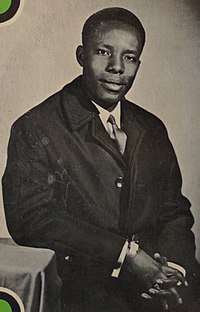Nico Kasanda
Nicolas Kasanda wa Mikalay (7 July 1939 – 22 September 1985), popularly known as Docteur Nico, was a guitarist, composer and one of the pioneers of Congolese music. He was born in Mikalayi in the Belgian Congo. He graduated in 1957 as a technical teacher, but inspired by his musical family, he took up the guitar and in time became a virtuoso soloist.[1][2]
Nico Kasanda | |
|---|---|
 Kasanda in the 1960s | |
| Background information | |
| Birth name | Nicolas Kasanda wa Mikalay |
| Also known as | Docteur Nico |
| Born | 7 July 1939 Mikalayi, Belgian Congo |
| Died | 22 September 1985 (aged 46) Brussels, Belgium |
| Genres | Soukous |
| Instruments | Guitar |
| Years active | 1957 – c. 1975 |
At the age of 14, Kasanda started playing with the seminal group Grand Kalle et l'African Jazz, led by Joseph "Grand Kalle" Kabaselle. He became an influential guitarist (Jimi Hendrix visited him while on tour in Paris), and the originator of the ubiquitous Congolese finger-picked guitar style, acquiring the nickname "Dr. Nico". African Jazz split up in 1963 when he and singer Tabu Ley Rochereau left to form L'Orchestra African Fiesta, which became one of the most popular bands in Africa.[1][2][3]
He withdrew from the music scene in the mid 1970s following the collapse of his Belgian record label, and made a few final recordings in Togo, not long before he died in a hospital in Brussels, Belgium in 1985.[1][2]
Discography
- Contributing artist
References
- AMC (27 July 2017). "Biography and History of Dr. Nico Kasanda". Allmusic.com (AMC). Retrieved 27 July 2017.
- Musica (9 April 2012). "Docteur Nico Kasanda". Nairobi: Kenyapage.net. Retrieved 27 July 2017.
- Norman Otis Richmond (14 April 2016). "Congolese rumba legend "Dr. Nico" supported Lumumba". Pambazuka News. Retrieved 27 July 2017.
Further reading
- Rumba on the River: A History of the Popular Music of the Two Congos (1999). Gary Stewart – ISBN 1-85984-368-9
External links
- 25 Years Since He Disappeared (Died) Posted on 21 September 2010 (Translated from the Original French Language)
- Discography of Docteur Nico
- Discography and biographical details in French and English